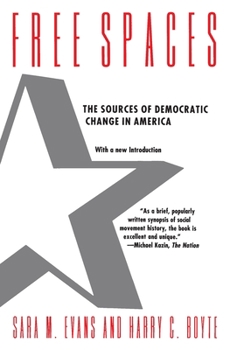Free Spaces: The Sources of Democratic Change in America
Select Format
Select Condition 
Book Overview
What are the environments, the public spaces, in which ordinary people become participants in the complex, ambiguous, engaging conversation about democracy: participators in governance rather than spectators or complainers, victims or accomplices? What are the roots, not simply of movements against oppression, but also of those democratic social movements which both enlarge the opportunities for participation and enhance people's ability to participate in the public world? In Free Spaces, Sara M. Evans and Harry C. Boyte argue for a new understanding of the foundations for democratic politics by analyzing the settings in which people learn to participate in democracy. In their new Introduction, the authors link the concept of free spaces to recent theoretical discussions about community, public life, civil society, and social movements.
Format:Paperback
Language:English
ISBN:0226222578
ISBN13:9780226222578
Release Date:April 1992
Publisher:University of Chicago Press
Length:268 Pages
Weight:0.67 lbs.
Dimensions:0.6" x 5.3" x 8.0"
Customer Reviews
1 rating
A Hopeful History of Democratic Spaces
Published by Thriftbooks.com User , 21 years ago
FREE SPACES, which came out around the same time as Bellah's HABITS OF THE HEART, is in many ways a perfect companion text in that it lays out the history of a variety of democratic and populist movements in America while HABITS OF THE HEART concentrates on the (then) present expression of the such movements (as well as the increasing number of Americans whose only community is the community of the self). The last chapter of FREE SPACES s perhaps the most compelling. It begins: "In 1849, one of Herman Melville's characters in his novel MARDI prsented to the people of Vivenze -- the United States -- a document that reminded them 'freedom is more social than political,' meant to suggest that democracy depended upon the virtue and intelligence of the citizens themselves. The book's dismal sales in the mid-nineteenth century seemed to Melville a disgusting confirmation of his warning. Today the same idea sounds to some a distant echo from the past." Pg. 182. And so is the project of Evans and Boyte as they tell the story of how Americans' political lifeblood and its engagement in the great issues of the day often bubbled up through religious and non-relgious organziations such as the black church, specifically, the African Methodist Espiscopal denomination, farmer's alliances like The Grange, labor movements such as the Knights of Labor and the IWW. They note that community, as characterized by the agons of democracy during the past two decades, is a reactionary conception, a construct that describes community as conservative, a vessel that contains family values, and whose subaltern members include wives and children who know their place and gratefully accept their roles. The actual communities of the past were often radically democratic, Evans and Boyte note, including blacks, whites and women in their attempts to regain control of their lives in the shadow of the rising corporatization of America.Melville, that great democrat, for the most part fell silent after MARDI, and to a large extent the great waves of national people's organizations that bloomed in reaction to the era of the Robber Baron and the corporatization fell silent, too. Boyte and Evans note that the Red Scare in the aftermath of WWI, the employment of propogandistic techniques developed during the mobilization for the war, the arrest and execution of labor and political activists, effectively scuttled these freedom movements in the late nineteenth and early 20th centuries. The movments arose again, although the next time under government auspices, and in a kind of whites only version of socialism, during the FDR and Truman administrations. Given a seat at the table in the post-war concensus, labor, business and government put together a compromise in light of challenge of the Communist sphere, and poured oil on the waters of discontent until the civil rights, women's, and anti-Vietnam war movments bubbled from the wellspring of the people up and demanded a new birt





